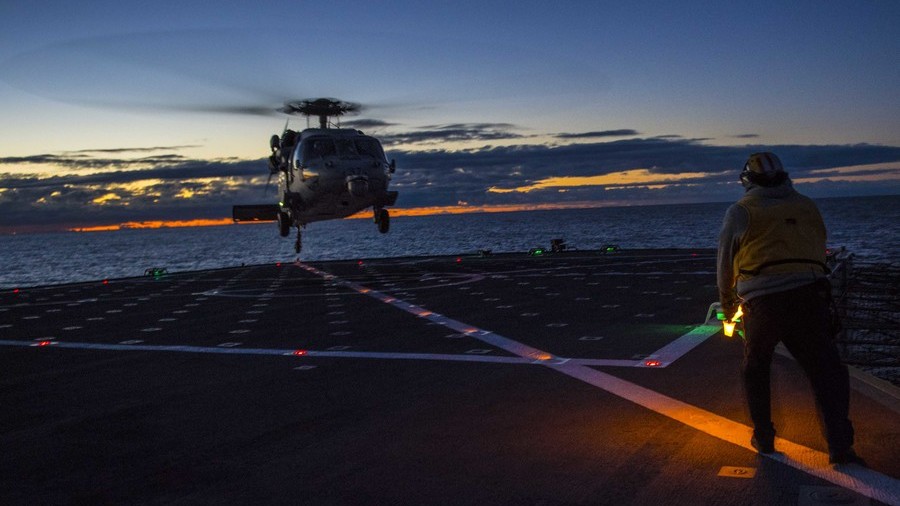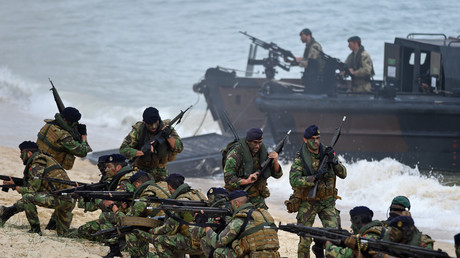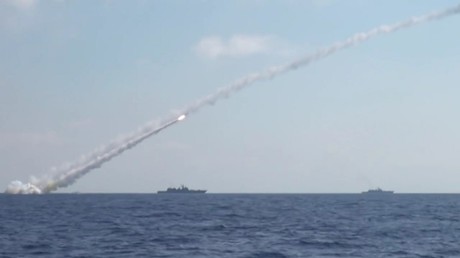NATO membership for Ukraine & Georgia would bring out the bear in Russia
Robert Bridge is an American writer and journalist. Former Editor-in-Chief of The Moscow News, he is author of the book, 'Midnight in the American Empire,' released in 2013.

Western leaders argue that the growth of NATO along Russia’s border together with the militarization of Eastern Europe is necessary for preserving peace with Moscow. Nothing could be further from the truth.
There has been an unmistakable trend in the realm of geopolitics since the start of the new millennium – of which Ukraine and Georgia may represent the next phase – and it bodes absolutely disastrous for the future of mankind. Indeed, it may very well lead to its ultimate destruction. I am talking about NATO’s incessant encroachment upon Russia’s borders amid a crumbling arms treaty architecture.
Despite past promises that such a scenario would never happen, and regardless of which US leader was holding power in Washington, NATO's relentless eastward advance – under the guise of one excuse or another – has been ongoing for many years.
A history of deception
Despite the relatively upbeat, positive mood that accompanied the collapse of the Soviet Union in 1991, West-Russia relations were already strained by 1999 as the Czech Republic, Hungary and Poland were newly absorbed into the Western military bloc. This was considered outrageous by many observers at the time since the Warsaw Pact had been dissolved almost a decade earlier.
However, the wheels really began to fall off the apple cart called ‘global stability’ when then-US president George W. Bush announced in late 2001 that he would withdraw the United States from the Anti-Ballistic Missile Treaty (ABM). Predicated on the suicidal rationale of “mutually assured destruction,” the arms control treaty managed to keep the peace for 30 long years between the nuclear powers. Putin called the decision “a mistake.”
The purpose of mentioning that abrogated treaty is that it has fueled Russia’s anxiety with regard to NATO’s ulterior motives ever since. With ABM out of the way, the United States was able to move forward with a missile defense shield in Eastern Europe. Despite some fits and starts by the Bush administration, and unfulfilled assurances by the Obama administration that the US would cooperate with Moscow on the system, such a partnership never transpired.
In May 2016, NATO announced that the missile defense base in Romania was fully operational.
Now, had Moscow sat back and done nothing, hoping that NATO would eventually accede to its request for cooperation, then the anti-missile defense system smack on Russia’s border would have been a real game-changer. But as we know, Russia did not sit back and do nothing. In fact, it did something rather incredible. Vladimir Putin revealed in March that Russia had developed – with mind-boggling swiftness – a number of advanced weapons systems, including a nuclear-powered cruise missile with nearly unlimited range. That weapon alone essentially makes NATO efforts to neutralize Russia’s nuclear deterrent obsolete.
Unfortunately, the US missile-defense system smoking in Russia’s geopolitical backyard is not Moscow’s only concern. Behind an advance guard comprised of Western media propaganda and think-tank fallacies, organizations responsible for disseminating unfounded accusations of ‘Russian aggression,’ NATO forces have been able to make serious inroads inside the territories of member states, primarily those that are situated close to or on the Russian border.
Poland, for example, despite already having a rotational US troop presence in its country, is now seeking a permanent US military footprint, even willing to pay $2 billion for the pleasure. In September, prior to a meeting with Polish President Andrzej Duda, Donald Trump said he would consider the proposal “very seriously.”
READ MORE: Trump mulls idea of permanent US military base in Poland, says Warsaw ‘likes it very much’
Meanwhile, coming shortly after a large-scale US-led military exercise called Saber Strike 18 on the territory of Poland, Latvia, Lithuania and Estonia, NATO is now in the middle of Trident Juncture 18 drills (October 25-November 7), involving some 45,000 troops from 31 countries. Designed to prepare for an act of aggression from a “foreign belligerent,” Western scare tactics of late make the identity of the fictional bogeyman rather obvious.
Taking aim at Ukraine and Georgia
For anyone who believes that US-led NATO would be content with 29 members in its rapidly growing military clique has not been following the arc of political events.
Undoubtedly, one of the worst recent flash-points in NATO-Russia relations came in February 2014, when a series of violent protests, prompted by Kiev opting out of an association agreement with the European Union, led to the ouster Ukrainian President Viktor Yanukovych and the overthrow of the government. A number of American – not Russian – politicians and diplomats, including the late John McCain and Victoria Nuland, appeared on the streets of Kiev at the height of the unrest, not just stoking the glowing embers of opposition, but literally helping to determine who would lead the country. However, it is Russia that is blamed to this day in the Western media for its “invasion of Ukraine.”
Much of that fabrication was based on a democratic referendum in Crimea, held at the height of hostilities when extreme-right forces were threatening the entire country, in which some 97 percent voted in favor of joining the Russian Federation. One year after that historic vote, Western media were forced to admit that positive sentiments towards Russia had not changed.
Yet even today, many Westerners still believe that Russia seized Crimea through military force thanks to comments like this example from a British tabloid: “In 2014, Russian forces annexed the Ukrainian region of Crimea, rapidly incorporating it into the Russian Federation.” Funny, not a single mention of a referendum among those 17 misguided words.
READ MORE: Crimea is Russian, the matter is finished
Another event that has allowed the Western world to portray Russia as the world’s foremost beast of burden is the five-day conflict between Russia and Georgia. Once again, here is how the Western media regularly explains that event: “Russia launched a large-scale land, air and sea invasion in 2008, accusing Georgia of aggression against Russian separatists in the South Ossetia region.” It’s pretty clear who sounds like the aggressor here since the above sentence puts the cart before the horse. In fact, it really was Georgia that was responsible for attacking and killing Russian peacekeepers stationed in South Ossetia, thereby triggering a Russian response.
It is largely on the basis of these two events, of which the Western public has an extremely poor understanding due to their agenda-based media, that an argument is being made with increasing frequency for Ukraine and Georgia to join NATO.
Needless to say, such a scenario would set West-Russia relations back to the Stone Age.
And that may be more literally the case than one would first realize, since we are now dealing with the possibility of nuclear weapons loose in the region. This comes after Donald Trump announced his intention to leave the decades-old Intermediate-Range Nuclear Forces Treaty (INF).
READ MORE: US quitting landmark INF treaty is 'fact’, Moscow prepares response to ‘questions’ – Lavrov
Analysts say such a move would bring the world closer to the outbreak of nuclear war.
Andrei Kelin, director of the Russian Foreign Ministry’s European Cooperation Department, said the risk of Georgia joining NATO, at a time when the US is talking about withdrawing from yet another arms treaty, would force Russia to respond with a “defense belt near Sochi.”
“We will have to spend colossal resources on preventing likely actions by a hypothetical enemy, this is inevitable,” Kelin told an audience at the Valdai discussion group, which meets annually in Russia. Ukraine’s accession to the alliance would also present equally serious considerations, and would force Russia “to shift the emphasis of our defense structures towards the south.”
In other words, unless some intelligent people start speaking up in the West, describing the reality of the situation in that Russia poses no threat to Western interests, then the likelihood of some future catastrophe will increase by a degree of magnitude.
While Kelin described Ukrainian and Georgian accession to NATO as “very unlikely” for the time being, we should keep in mind that most people also thought it “very unlikely” just five years ago that US-Russia relations would hit rock bottom in a matter of just months.
If one thing is certain these days, it would surely have to be the level of uncertainty in the world of geopolitics. That should be of tremendous concern to all of us.
Like this story? Share it with a friend!
The statements, views and opinions expressed in this column are solely those of the author and do not necessarily represent those of RT.



0 Comments:
Post a Comment
Subscribe to Post Comments [Atom]
<< Home